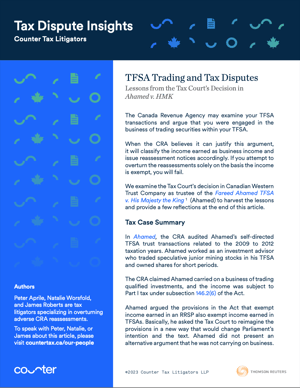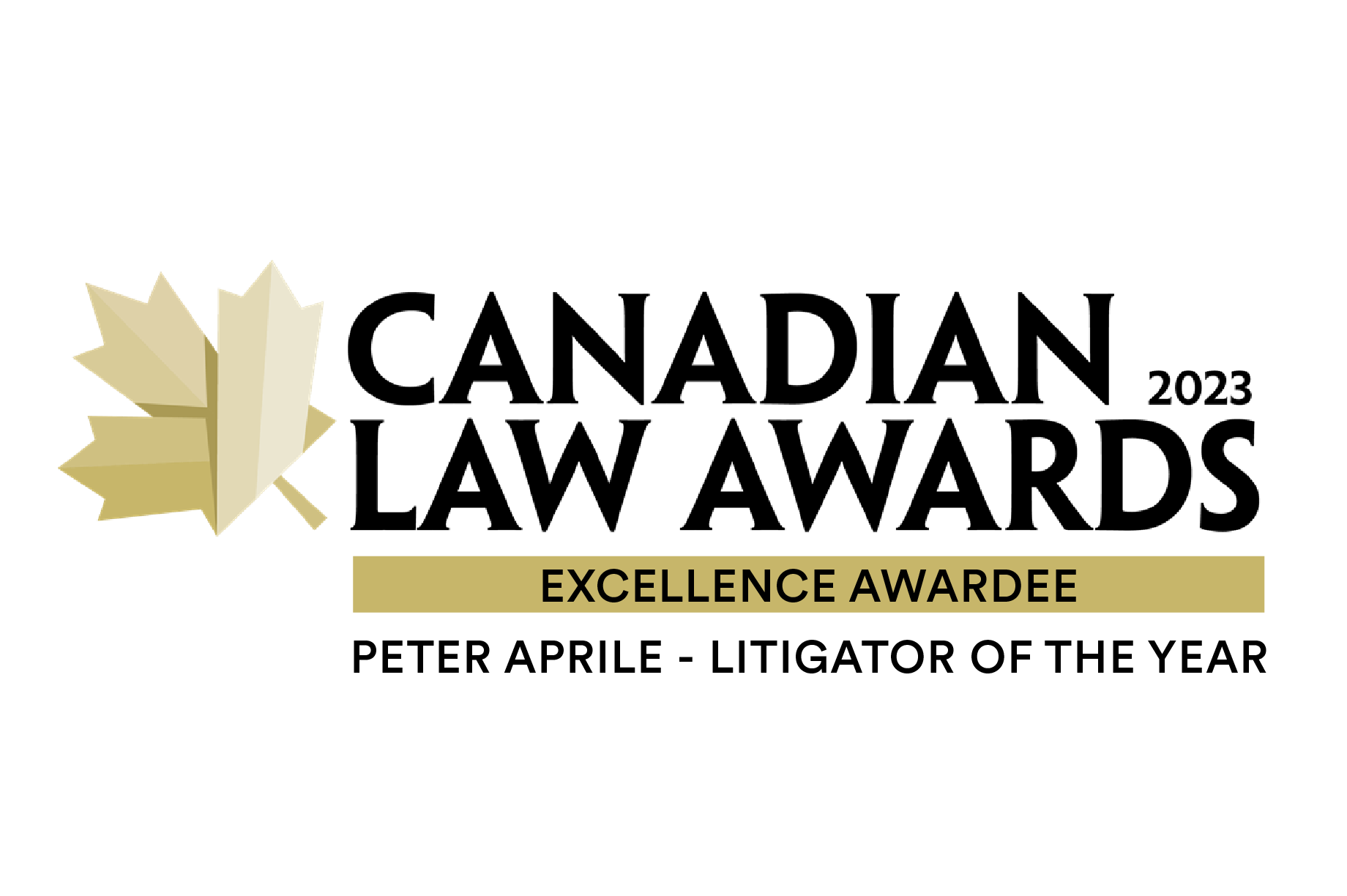
*Thompson Reuters considers the authors “leading tax experts and litigators”. The authors agreed to grant TR partial rights to this work. This article first appeared in TR’s Tax Dispute and Resolution Centre.*
The Canada Revenue Agency may examine your TFSA transactions and argue that you were engaged in the business of trading securities within your TFSA.
 When the CRA believes it can justify this argument, it will classify the income earned as business income and issue reassessment notices accordingly. If you attempt to overturn the reassessments solely on the basis the income is exempt, you will fail.
When the CRA believes it can justify this argument, it will classify the income earned as business income and issue reassessment notices accordingly. If you attempt to overturn the reassessments solely on the basis the income is exempt, you will fail.
We examine the Tax Court’s decision in Canadian Western Trust Company as trustee of the Fareed Ahamed TFSA v. His Majesty the King1 (Ahamed) to harvest the lessons and provide a few reflections at the end of this article.
Tax Case Summary
In Ahamed, the CRA audited Ahamed’s self-directed TFSA trust transactions related to the 2009 to 2012 taxation years. Ahamed worked as an investment advisor who traded speculative junior mining stocks in his TFSA and owned shares for short periods.
The CRA claimed Ahamed carried on a business of trading qualified investments, and the income was subject to Part I tax under subsection 146.2(6) of the Act.
Ahamed argued the provisions in the Act that exempt income earned in an RRSP also exempt income earned in TFSAs. Basically, he asked the Tax Court to reimagine the provisions in a new way that would change Parliament’s intention and the text. Ahamed did not present an alternative argument that he was not carrying on business.
Ahamed offered different reasons to support his interpretation of the relevant provisions. For example, he asked the Tax Court to use a 1969 Revenue Canada letter about the RRSP provisions as evidence. He also relied on the Tax Court’s obiter statement in Prochuk that “trading qualified investments cannot constitute the ‘carrying on of a business’ within an RRSP” to argue the same applies to TFSAs.2 Justice Spiro rejected Ahamed’s legal argument.
Justice Spiro’s analysis starts by interpreting subsection 146.2(6) of the Act. The subsection includes the words “carries on one or more business”. The text and its meaning are clear. Justice Spiro underscored the Supreme Court’s direction to give more weight to the text (over context and purpose) when interpreting legislation.
_MidnightBlueGradient.jpg?width=4000&height=1771&name=CounterBlogPattern(2)_MidnightBlueGradient.jpg)
Also, Justice Spiro examined Parliament’s purpose and objectives when drafting legislation. He quoted the Supreme Court of Canada and other sources to highlight that assuming a single purpose oversimplifies Parliament’s intention and objectives.
How did Parliament intend to achieve this primary purpose? To answer that question, we must consider the limits that Parliament chose in order to achieve its overall objective in a fiscally responsible way. As Professor Sullivan notes, the “legislature never pursues a goal single-mindedly, without qualification, and at all costs. There are always additional or competing factors to be taken into account.3
Ahamed’s arguments misinterpreted or twisted the applicable provisions.
This Court has no power to redraft Parliament’s TFSA legislation to incorporate (a) policies inferred from interdepartmental correspondence relating to a different statutory scheme, (b) policies transplanted from a different statutory scheme, or (c) obiter dicta found in reasons for judgment dealing with a different statutory scheme (i.e., Prochuk).4
Justice Spiro did not find Ahamed’s arguments compelling. He found subsection 146.2(6) clear and unambiguous, and applied the law to the parties’ agreed facts.
The outcome was predictable. Justice Spiro dismissed Ahamed’s appeal, with costs.
Insights
Evaluating Tax Cases with Skill & Understanding
Ahamed’s legal argument was, with respect, weak. And, as noted earlier, he did not argue he was not carrying on business. It seems Ahamed was grasping at straws. But we don’t read the Court’s reasons and smirk.
Professor Sullivan reminds us in Ahamed there are always different and competing factors at play when evaluating Parliament’s purpose and methods. The same is true when evaluating Ahamed’s purpose and methods in this case.
In every case, there are always competing personal, business, and legal factors at play. The Tax Court’s reasons don’t tell the whole story. It’s easy to oversimplify, fall into the “knew-it-all-along effect”, and speak about cases from a distance and in an unskillful way.
In every case, there are always competing personal, business, and legal factors at play. The Tax Court’s reasons don’t tell the whole story. It’s easy to oversimplify, fall into the “knew-it-all-along effect”, and speak about cases from a distance and in an unskillful way.
- Peter Aprile, Partner, Tax Litigation
Ahamed’s Broader Impact
We do feel concerned Ahamed might have a broader impact. The CRA is already targeting more HNWIs and TFSAs. Ahamed will give the CRA even more confidence to expand the audit scope and expand boundaries. We expect this will lead to more tax disputes related to TFSA activity and a CRA opponent more likely to persist, even when mistaken.
Early Tax Dispute Strategy Matters
When evaluating whether someone is “carrying on business” is a question of fact and law. And the facts, evidence, and assumptions established early in the process can have an outsized impact on the outcome of the case.
We’ve observed a common oversight among some taxpayers and advisors: a misguided view of the specific dispute, specific stakeholders, and the audit and objection stages. If the CRA believes it can justify the argument that a taxpayer was carrying on a business, it is unlikely that the taxpayer or their representatives will convince the CRA otherwise during the audit or objection stages. Instead, the CRA is likely to use the opportunity to select the data and refine the frame in a way that supports their case.
If the CRA believes it can justify the argument that a taxpayer was carrying on a business, it is unlikely that the taxpayer or their representatives will convince the CRA otherwise during the audit or objection stages. Instead, the CRA is likely to use the opportunity to select the data and refine the frame in a way that supports their case.
- Peter Aprile, Partner, Tax Litigation
It is common for taxpayers and their advisors to approach tax disputes in a somewhat naïve way and thinking things will not escalate. Audits or objections not executed properly contain obvious and imperceptible missteps with costly effects on the later stages.
A strategic approach and experienced professionals are critical in managing tax disputes to minimize disruption and financial losses. By executing the right strategy from the beginning, taxpayers can avoid significant costs.
Nota Bene: Ahamed appealed the Tax Court decision to the Federal Court of Appeal. While we respect his right to do so, it is unclear to us why Ahamed or his counsel would expect a different result. We expect the FCA will likely dismiss Ahamed’s appeal, with costs. An update will be provided when the FCA releases its decision.
References
1 Ahamed v. The King, 2023 TCC 17.
2 Ibid at para 33.
3 Ibid at para 76.
4 Ibid at para 92.

.jpg?width=120&name=Counter%20Tax%20Litigators%20Logo%20Stacked%20(MidnightBlue%20on%20White).jpg)













.png?width=400&height=400&name=CT-How_Can_We_Help-22_july_NewGraphic_b(small).png)

.png?width=1386&height=1224&name=2025%20Legal500%20Elite%20Boutique%20Award%20(Badge).png)
.png?width=1386&height=1224&name=ITR%20Finalist%20Practice%20Leader%20of%20Year%20Peter%20Aprile%202024%20(Badge).png)
.png?width=1386&height=1224&name=2025%20Legal500%20Leading%20Firm%20Client%20Satisfaction%20Award%20(Badge).png)





.png?width=1386&height=1224&name=ITR%20Tax%20Innovator%20Finalist%202024%20Award%20(Badge).png)
